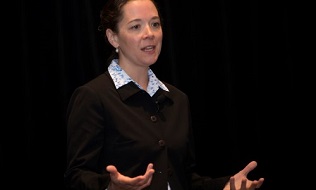

Bonnie-Jeanne MacDonald wants to challenge the many rules of thumb she says are misleading and potentially harmful when it comes to retirement security.
MacDonald, a senior research fellow at Ryerson University’s National Institute of Ageing and resident scholar at Eckler Ltd., told an audience at the Benefits Canada Defined Contribution Investment Forum 2017 that Canada’s defined contribution pension system follows a number of paradigms that don’t stand up to scrutiny.
Many people in the industry, she noted, have acknowledged the inaccuracy of those rules but are willing to put up with them because they get people thinking about saving for retirement.
Read: Leveraging technology to help plan members grasp the other side of the retirement equation
“My fear is that that these rules of thumb have no evidence and they are actually misleading people into making decisions that are not good for them and can harm them,” said MacDonald. “A little knowledge is a dangerous thing. The enemy of knowledge isn’t ignorance; it’s the illusion of knowledge.”
MacDonald said the Canada Pension Plan provides a perfect example of the problem, because many people believe it’s best to start claiming it as soon as they’re eligible. MacDonald, however, said that’s not always true, particularly for those without adequate and secure income who are expecting to depend on savings to sustain them in retirement.
“It’s actually in many people’s best interest to delay their CPP,” she said, adding that delaying receipt until age 70 can provide significant protection against investment risk and the risk of outliving savings.
Another piece of conventional wisdom in MacDonald’s crosshairs is the idea that pensioners must replace 70 per cent of their employment income to sustain their living standards in retirement. After conducting an extensive literature review, she found no evidence to back up that paradigm.
“Whenever it’s shown, it’s using made-up people. That’s not evidence,” said MacDonald.
Using data provided by Statistics Canada, she conducted her own study with colleagues and found that the income replacement rate achieved by individuals “had no predictive value in terms of how well people’s living standards will be maintained in retirement.”
Read: Challenging the rules of thumb: Taking CPP early, the value of annuitizing and saving 10%
She suggested that by basing their savings target on their current disposable income, rather than 70 per cent of their earnings, workers can come up with a more accurate estimate for what they’ll need in retirement.
That way, she said if people want to improve their living standards, they can aim to increase the amount of spending money they have available once their working life is over.
In addition, she said other rules of thumb that have stuck in the public consciousness, including the notion that people should save 10 per cent of their salary to sufficiently provide for retirement and that pensioners should annuitize as much of their savings as possible, rely on outdated or incomplete assumptions.
“You can help your plan members by moving away from rules of thumb,” MacDonald told attendees at the conference.
“They are misleading and potentially harmful. Instead, encourage and support plan members to actually get clarity on their financial prospects because at the end of the day, we want to help people and I believe if we can help Canadians see their retirement financial prospects as clearly as possible, they will make informed decisions and have better retirement outcomes.”
Read more articles from the 2017 DC Investment Forum
